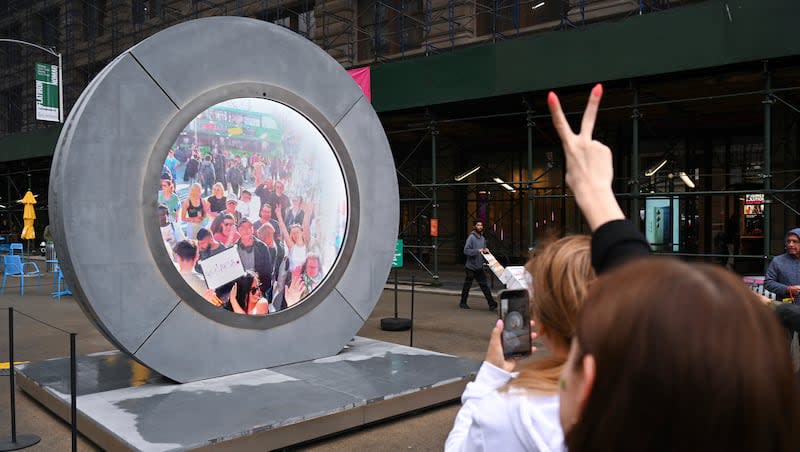The NYC-Dublin portal is a great idea. It’s just in the wrong place at the wrong time

America is rightly proud of her great cities. New York City, in particular, exists both as one of the most important cities in the world and a dazzling emblem of America and her diversity writ large.
But that doesn’t mean you can stick a video camera in the middle of New York City and expect the teeming masses to be on their best behavior. Not in 2024.
We learned this the hard way after a livestream that allowed people in Dublin and New York City to communicate with each other via a “portal” was shut down within a week after what The New York Times called “flashing and other shenanigans” and “questionable behavior.”
Actually, there was nothing questionable about it, just something we are too often lamenting these days: grown-ups behaving badly.
In 2001, Steve Allen wrote “Vulgarians at the Gate” about the lowering of standards in entertainment. The vulgarians at the portal were arguably worse, since the the behavior was on public streets and included not just obscenity (an OnlyFans performer exposing her breasts) but sly cruelty (a New Yorker holding up a potato to mock Ireland’s Great Famine, a Dubliner holding up a video from 9/11).
It was as if the portal was some sort of invitation to “show us your worst” rather than to foster “joy and connectedness” between the two cities as the creators promised.
While most interactions in the portal, which went live on May 8, were positive or at least benign, some were repugnant enough that the livestream was taken down May 14 so the Flatiron Nomad Partnership could “install software updates ‘to limit such behaviour appearing on the livestream,’” according to the BBC. The portal reopened Sunday with security measures in place — we might call them “parental controls.”
Now the portal will only operate between 6 a.m. and 4 p.m. in New York (11 a.m.-9 p.m. in Dublin), security guards will be positioned on both ends, and if anything goes awry, the feed on both sides will be blurred.
Because this is what happens when you can’t trust grown-ups to be grown-ups anymore.
Every now and then, a video or photograph passes through my X feed that shows people walking the streets of New York City a century or so ago, and people remark on how well-dressed and well-behaved everyone is. I take them with a grain of salt; they’re snapshots in time, and the human impulse toward misbehavior dates to Eden.
That said, it’s hard to imagine these elegant men and women pausing by a photographer of the time and making a lewd gesture, pulling up their shirt or pulling down their pants. Just like a half-century ago, it would be hard to imagine our elected representatives behaving as some have recently in official congressional proceedings.
New York City in 1911 - 100% of the people in this footage have passed away by now. pic.twitter.com/br6hZPSsRE
— Vico (@Vicoseven) November 8, 2023
For that matter, it’s hard to imagine the bad behavior that temporarily forced the closure of the portal taking place in many parts of America, and the world, today.
I promise that there are communities in the deep South and Mountain West where security guards would not be necessary at a portal, at least not during the day. It should be noted that people in Lublin, Poland, and Vilnius, Lithuania, have been waving at each other through their portal since 2021. And New York City had a real-time video link to London for a month in 2008 without making international headlines for the wrong reasons.
But vulgar and tawdry behavior in public spaces has accelerated since then to the point where hardly anyone blinks when the vice president of the United States, Kamala Harris, uses a once-shocking profanity in an address to young people. We have de-emphasized civility to the brink of disappearing it.
It’s rare to hear people talking about the need for “dignified” behavior these days; the word itself seems quaint. But the lack of dignity — which my old-fashioned, 2,074-page American Heritage Dictionary describes as “the quality of being worthy of esteem or respect” — seems the root of every bad behavior, from those on display at the portal to those that just haven’t gotten there yet.
Meanwhile, many in the modern culture don’t just wink at bad behavior, but actively defend it, like the woman who wrote — in an essay entitled “We Were Always Going to Moon the Portal” — that “there is something at least a little charming about this collective urge toward obscenity,” which makes me really glad that my children didn’t grow up wherever the writer lives.
I don’t think we were always going to moon the portal. We weren’t going to moon it in 1917, when the MoonPie was invented, or in 1969, when Neil Armstrong became the first human to set foot on lunar soil. Maybe the essayist is right and we are always going to moon it from this day forward. The New York Times seems to think so, writing pessimistically about the reopening: “The Portal is back. For now.”
If so, that is one giant leap back for mankind. Dignity, we hardly knew ye. Rest in peace.

